
Blur are an English rock band formed in London in 1988. The band consists of singer Damon Albarn, guitarist Graham Coxon, bass guitarist Alex James and drummer Dave Rowntree. Their debut album, Leisure (1991), incorporated the sounds of Madchester and shoegaze. Following a stylistic change influenced by English guitar pop groups such as the Kinks, the Beatles and XTC, Blur released Modern Life Is Rubbish (1993), Parklife (1994) and The Great Escape (1995). As a result, the band helped to popularise the Britpop genre and achieved mass popularity in the UK, aided by a chart battle with rival band Oasis in 1995 dubbed "The Battle of Britpop".

Parklife is the third studio album by the English rock band Blur, released on 25 April 1994 on Food Records. After moderate sales for their previous album Modern Life Is Rubbish (1993), Parklife returned Blur to prominence in the UK, helped by its four hit singles: "Girls & Boys", "End of a Century", "Parklife" and "To the End".
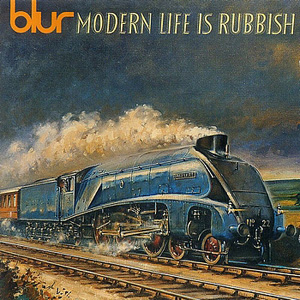
Modern Life Is Rubbish is the second studio album by English alternative rock band Blur, released in May 1993. Although their debut album Leisure (1991) had been commercially successful, Blur faced a severe media backlash soon after its release, and fell out of public favour. After the group returned from an unsuccessful tour of the United States, poorly received live performances and the rising popularity of rival band Suede further diminished Blur's status in the UK.

Blur is the fifth studio album by the English rock band Blur, released on 10 February 1997 by Food Records. Blur had previously been broadly critical of American popular culture and their previous albums had become associated with the Britpop movement, particularly Parklife, which had helped them become one of Britain's leading pop acts. After their previous album, The Great Escape, the band faced media backlash and relationships between the members became strained.

"Country House" is a song by English alternative rock band Blur. It was released as the lead single from the band's fourth studio album, The Great Escape (1995), on 14 August 1995. Released on the same day as the Oasis single "Roll with It" – in a chart battle dubbed the "Battle of Britpop" – "Country House" reached number one in the UK Singles Chart. The song is the band's best-selling single, with over 540,000 copies sold as of May 2014.
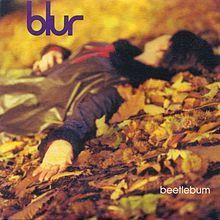
"Beetlebum" is a song by English alternative rock band Blur. It was released on 20 January 1997 as the lead single from the band's eponymous fifth album, Blur (1997). Written about Blur frontman Damon Albarn's experiences with heroin, the song features Beatles-influenced music and a mood that Albarn described as "sleepy" and "sexy".

"Song 2" is a song by English rock band Blur. The song is the second song on their eponymous fifth studio album. Released physically on 7 April 1997, "Song 2" peaked at number two on the UK Singles Chart, number four on the Australian ARIA Singles Chart, and number six on the US Billboard Modern Rock Tracks chart.
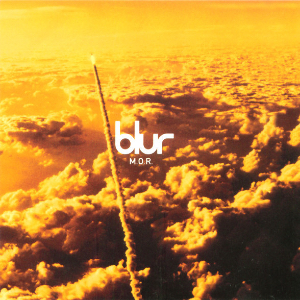
"M.O.R." is a song by English rock band Blur from their eponymous album. Released on 15 September 1997, "M.O.R." reached number 15 in the UK Singles Chart on its release as a single in September 1997. Worldwide, it reached number 45 in New Zealand and also charted in Australia, Canada, and the United States.
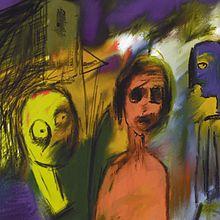
"Coffee & TV" is a song by British rock band Blur. It was written by the band's guitarist, Graham Coxon, who also sang lead vocals rather than frontman Damon Albarn. The song appears on Blur's sixth studio album, 13 (1999), and was the second single released from the album on 28 June 1999. The lyrics describe Coxon's struggle with alcoholism and the song's video, featuring a sentient milk carton searching for Coxon, won several awards. Commercially, "Coffee & TV" reached No. 11 in the United Kingdom and No. 26 in Ireland. It was a major hit in Iceland, where it peaked at No. 2 in September 1999.

"Tender" is a song by English rock band Blur from their sixth studio album, 13 (1999). Written by the four band members about Blur frontman Damon Albarn's breakup with musician turned painter Justine Frischmann, the song became Blur's eleventh top-10 hit on the UK Singles Chart, debuting and peaking at number two on 28 February 1999. It also reached the top 20 in Greece, Iceland, Ireland, Italy, New Zealand, Norway, and Spain.
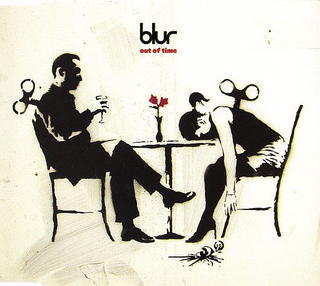
"Out of Time" is a song by British band Blur from their seventh studio album, Think Tank (2003). The song was written and produced by band members Damon Albarn, Alex James and Dave Rowntree, with Ben Hillier also serving as a producer. After being premiered via BBC Radio 1 on 3 March, it was released as the album's lead single on 14 April 2003, by Parlophone. The song became the band's first release without guitarist Graham Coxon. It is a pop ballad featuring acoustic guitars and bass, as well as a Moroccan orchestra. Lyrically, it deals with a civilisation that has lost touch, with Coxon's departure being referenced in the lyrics.

"Crazy Beat" is a song by English band Blur from their seventh album, Think Tank (2003). The song was written and produced by band members Damon Albarn, Alex James and Dave Rowntree in Morocco, with Norman Cook also serving as a producer. It was first serviced to alternative radio stations in the United States on 17 March 2003, by Virgin Records, while being commercially released in the United Kingdom on 7 July 2003, by Parlophone, including the songs "The Outsider" and "Don't Be" as B-sides. A three-chord song, "Crazy Beat" is a dance-pop and electropop track which draws influences of big beat and nu metal into its composition. Lyrically, it praises the effects of music and clubs on crowds.

"Girls & Boys" is a song by the English rock band Blur, released in March 1994 by Food Records as the lead single from the group's third studio album, Parklife (1994). Charting at number five on the UK Singles Chart, "Girls & Boys" was Blur's first top-five hit and their most successful single until "Country House" reached number one the following year. The single surpassed their previous commercial peak "There's No Other Way" by three spots on the UK Singles Chart and saw the group achieve greater worldwide success. In the US, the track reached number 59 on the US Billboard Hot 100 chart, becoming the band's second single to enter the chart after "There's No Other Way". It also reached number four on the Billboard Modern Rock songs chart. Frontman of Blur, Damon Albarn wrote the song's lyrics with bandmembers Graham Coxon, Alex James and Dave Rowntree, while Stephen Street produced it.

"The Universal" is a song by English alternative rock band Blur and is featured on their fourth studio album, The Great Escape (1995). It was released on 13 November 1995 as the second single from that album, charting at number five on the UK Singles Chart and number 12 in both Iceland and Ireland.
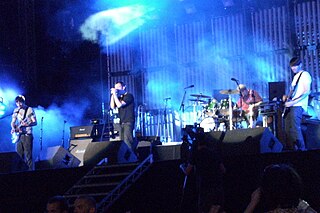
The discography of English rock band Blur consists of nine studio albums, five live albums, five compilation albums, one remix album, two video albums, four extended plays, 35 singles, 10 promotional singles and 37 music videos. Formed in London in 1988, the group consists of singer/keyboardist Damon Albarn, guitarist/singer Graham Coxon, bassist Alex James and drummer Dave Rowntree. Three years later, their debut release, the Madchester and shoegazing-tinged Leisure (1991), peaked at number seven on the UK Albums Chart. Modern Life Is Rubbish (1993) inaugurated the Britpop phase of their career. Its multi-Platinum follow-ups Parklife (1994) and The Great Escape (1995) helped the band achieve mainstream popularity in Britain; every Blur studio album from Parklife onwards has topped the British charts.
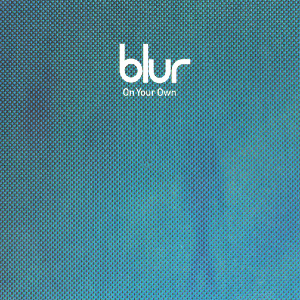
"On Your Own" is a song by English rock band Blur. It was released as a single on 16 June 1997 from the band's fifth studio album, Blur (1997). It charted at number five on the UK Singles Chart. Although it was not released under the Gorillaz name, Damon Albarn, frontman of both musical projects, has since referred the song as 'one of the first ever Gorillaz tunes'.

"Stereotypes" is a song by English alternative rock band Blur and is the opening track to their fourth studio album, The Great Escape (1995). It was released on 12 February 1996 as the third single from that album, charting at number seven on the UK Singles Chart. It also became a minor hit in Australia, peaking at number 95 on the ARIA Singles Chart in June 1996. The accompanying UK B-sides—"The Man Who Left Himself", "Tame" and "Ludwig"—demonstrated a dramatic change in style for Blur, being stark and raw, foreshadowing the stylistic shift that would realize itself on their eponymous follow-up album.

"Charmless Man" is a song by English alternative rock band Blur and is the fourth track on their fourth studio album, The Great Escape (1995). It was released on 29 April 1996 in the United Kingdom as the fourth and final single from that album, reaching number five on the UK Singles Chart and also charting in Australia, France, Iceland, and Ireland.

"To the End" is a song by English alternative rock band Blur. It appears on their third studio album, Parklife (1994), and was released as a single in May 1994 by Food Records. The song describes a couple unsuccessfully trying to overcome a bad patch in a relationship, and features full orchestral accompaniment with a choric refrain in French by Lætitia Sadier from Stereolab. The song was produced by Stephen Hague, unlike the rest of the Parklife album, which was produced by Stephen Street. Blur have produced several different recordings of the song.

"End of a Century" is a song by English alternative rock band Blur. Released in November 1994, it was the last single to be released from their third album, Parklife (1994). "End of a Century" reached number 19 on the UK Singles Chart, considered a disappointment by Andy Ross of Food Records. Albarn later stated that "End of a Century" may not have been the best choice for the album's fourth single, and that "This Is a Low" would have been a better alternative.




















